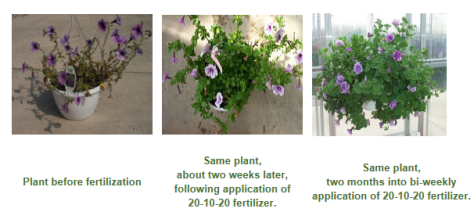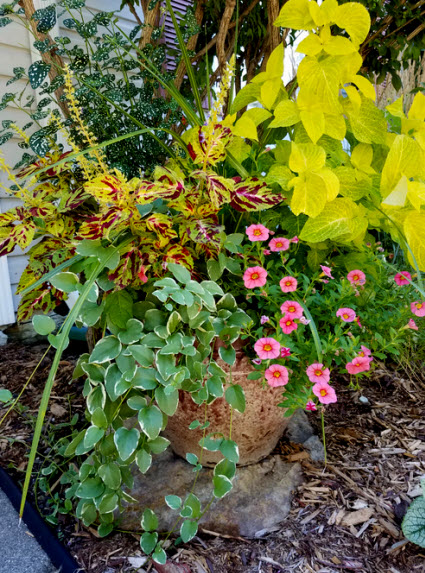Click below to listen to my 2 min Garden Bite radio show: The poop on fertilizing plants
First let’s establish that there’s no poop involved in fertilizing! Manure does not add much for nutrients into the soil, it fluffs it.
On to the whole fertilizing thing. I’m notoriously bad at this, so, in that vein, I’m going to help you AND me!
Proven Winners, one of the top plant breeders, says it’s really important to feed your container plants. That makes sense, they’re roots can only go so far and get so much!

I’ve always been an advocate for “less is better” when it comes to fertilizing and I’m not alone, there is, literally, a burnout. So what are those 3 numbers on the package of fertilizer. Click on the ABC’s of NPK:
N – nitrogen is for foliage
P – phosphorus is for fruits (flowers) and roots
K – potassium is for overall health
The photo below is from Proven Winners and “proves” what fertilizer can do!
 The next question is what kind of fertilizer should I be using? There are 3 main kinds of fertilizer:
The next question is what kind of fertilizer should I be using? There are 3 main kinds of fertilizer:
Water soluble – the oldest form mixes with water. A general rule of thumb is to look for a 20-10-20 option. This is really the best for container plants.
Slow release – the 2nd form of fertilizer looks like pellets (think Osmocote). It releases fertilizer based on microbial activity in the soil. (more information on that is in the link above) Mix into the soil when planting or top dress your plants. That means to sprinkle the appropriate amount on the top of the soil.
Controlled release – is the newest form and releases fertilizer based on temperature. If it’s cool out, they don’t release any fertilizer, your plants don’t need it. Mix into the soil when planting or top dress your plants.
Choose your specific formulation based on how long your growing season is. In other words annuals that will last for 4 months have no need for an 8 month fertilizer. Shrubs and perennials would benefit from the longer term formulation. The fertilizer package should tell you how long the fertilizer will last.
AND ALWAYS READ THE LABEL!

